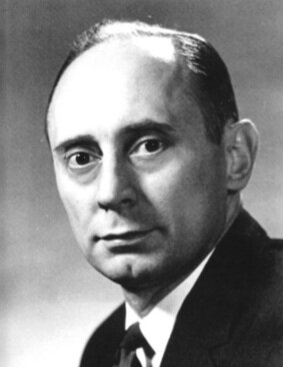
Stanley Peterson
The Peterson Literary Fund
Created by the late Stanley Peterson, a Ukrainian-Canadian philanthropist, whose life story embodied the harrowing experiences of many East European émigrés who escaped persecution and war, finding refuge and freedom in Canada

“My dream is to create a Canadian literary fund with Ukrainian roots and a global reach.”
Stanley Peterson
Stanley Peterson (1921-2012) was born Bohdan Patyk and grew up in Polish-controlled Galicia in Western Ukraine. In 1940, shortly after the Red Army invaded the region, Bohdan and his cousin attempted to flee to the West. The human smuggler whom they had hired to take them to the border crossing abandoned them and, within days, they were caught and handed over to the NKVD. Fearing retribution by Soviet authorities, Bohdan hid his Ukrainian identity and assumed the Polish name of Stanisław Przybyszewski. But his attempt to save himself was to no avail. In late October 1940, he was sentenced to three years of forced labour and sent to the Gulag. Initially, he toiled in the Kotlas transit camp in Arkhangelsk, Russia, but by February 1941, he was sent to one of the NKVD’s notorious hard labour camps in Ukhto-Izhemsky in the Arctic Komi region. Stanisław and his fellow prisoners — primarily Ukrainians, Poles, and Jews — subsisted on a mere 100 grams of kasha and 100 grams of bread per day.
After Hitler’s invasion of the Soviet Union in June 1941 and following the signing of the Sikorski-Maisky Agreement, by late August, Stanisław, along with thousands of other prisoners who had been deported from Polish-held territories, was released from the Gulag. Embarking on a gruelling journey, he set off for the Middle East to join Allied Forces fighting the Nazis. Making his way from Siberia, through Kazakhstan and then Uzbekistan, he enlisted into General Anders’ forces in March of 1942. Afflicted with typhoid and then yellow fever, Stanisław was hospitalized several times. Battling extreme weather, hunger, tuberculosis, and malaria, he and his unit made their way from Turkmenia to Persia. As hundreds of his fellow soldiers died of disease and exhaustion, he relapsed, eventually landing in a Tehran army hospital, gravely ill, severely malnourished, and weighing a mere 83 pounds. It was while hospitalized in Iran that Stanisław’s voracious appetite for reading and gift for foreign languages emerged. While convalescing, he studied and honed his English and Farsi. After passing a language proficiency test, he was hired by the joint “British-American Military Transportation Committee” overseen by Britain’s War Office. Dispatched to the military supply corridor in southern Persia, he worked under harsh conditions and extreme heat. After residing in a refugee camp in the Iranian district of Ahvaz, Stanisław eventually made his way to East India in 1943 and to a transit camp in Karachi, then onward to Kenya.
Like countless other East European refugees, he went on to settle in East Africa, spending six years overseeing a Displaced Persons Camp in British-controlled Uganda. It was in this DP camp near Kampala that Stanisław met and married his wife, Christina, herself a former victim of Stalin’s forced deportations to Kazakhstan.
Shortly after arriving in Canada in 1949 as a refugee, encouraged by a supportive Canadian employer, he pursued his studies and became a successful Chartered Accountant. Like many immigrants, to better fit into Canadian society he changed his name to Stanley Peterson.
Ambitious, talented, and possessing a sharp intellect, Peterson initially worked in the private sector in Toronto, later rising through the ranks of the provincial civil service, holding senior positions with the Ontario Development Corporation. Possessing a keen interest in finance, and driven by discipline and unrelenting research, over the course of 60 years, Peterson built an extensive investment portfolio, enabling him to become a passionate benefactor.
Proudly Canadian, Stanley Peterson never forgot his Ukrainian roots and the importance of freedom and human dignity. He devoted his life to supporting educational and humanitarian causes in Canada and around the world. He donated millions of dollars towards democracy-building projects, the publication of works by Soviet dissident writers, and the advancement of compelling literature that confronted Russian colonialist narratives.
Stanley Peterson was a major benefactor of countless projects, including the Petro Jacyk Ukrainian Language Competition and Smoloskyp publishers, whose books focused on literature, history, politics, and human rights. In 1998, thanks to a long-time partnership with Canadian Friends of Ukraine, Peterson provided major seed money for the establishment of the Canada-Ukraine Parliamentary Resource Centre in Kyiv, which evolved into an international development project supported by the Canadian Government from 1998 to 2001.
A gifted amateur writer, proficient in five languages and inspired by a lifelong love of books, the literary fund that Stanley Peterson created is a lasting testament to his humanity, generosity, and farsighted vision.
Stanly Peterson Biogaphy




